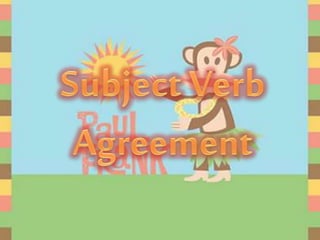
Subject verb agreement
- 2. Two singular subjects connected byorornorrequire a singular verb Example: Myaunt ormyuncleis arrivingbytraintoday.
- 3. Two singular subjects connected byeither/ororneither/norrequire a singular verb as in Rule 1. Example :1.NeitherJuannorCarmenisavailable. 2.EitherKianaorCaseyishelpingtodaywithstage decorations.
- 4. WhenIis one of the two subjects connected by either/oror neither/nor,put it secondand follow it withthe singularverb am. Example: NeithershenorIamgoingtothe festival.
- 5. When a singular subjectis connected by oror norto a plural subject, put the plural subject last and use a plural verb. Example : The serving bowl or the plates go on that shelf.
- 6. When asingular and plural subjectare connected by either/oror neither/nor,put the plural subjectlast and use aplural verb. Example : Neither Jenny nor the others are available
- 7. As a general rule, use a plural verb with two or more subjects when they are connected byand. Example : Acarandabikearemymeansof transportation.
- 8. Sometimesthe subjectis separatedfromthe verb by words such as alongwith,aswellas,besides, or not. Ignore these expressionswhen determining whether to use a singular or plural verb. Example :Thepolitician,alongwiththe newsmen,isexpectedshortly.
- 9. The pronouns each,everyone,everyone,everybody, anyone,anybody,someone, andsomebody are singular and require singularverbs. Do not be misled by what followsof. Example :Eachofthegirlssingswell. Everyoneofthecakesisgone.
- 10. With wordsthat indicateportions—percent, fraction,part,majority,some,all,none,remainder, and so forth—look at the noun in yourofphrase (object of the preposition)to determine whether to use a singularor pluralverb. If the object of the preposition is singular,use a singular verb. If the objectof the prepositionis plural,use a plural verb.
- 12. The expression thenumberis followed by a singular verb while the expression anumberis followed by a plural verb. Example : 1)The number of people we need to hire is thirteen. 2.)Anumberofpeoplehavewrittenin aboutthissubject.
- 13. Wheneitherand neitherare subjects, they always takesingular verbs. Example : 1.)Neitherofthemisavailable to speakrightnow. 2.)Eitherofusiscapableofdoingthejob.
- 14. The words hereand therehave generallybeen labeled as adverbs even though they indicateplace.In sentences beginningwith hereor there, the subject follows the verb. Example : 1.)Therearefourhurdlestojump. 2.)Thereisahighhurdletojump.
- 15. Use a singular verb with sums of moneyor periods of time. Example : 1.)Tendollarsisahighprice topay. 2.)Fiveyearsisthemaximum sentenceforthatoffense.
- 16. Sometimes the pronounwho,that, orwhichis the subject of a verb in the middle of thesentence. The pronouns who,that, and whichbecome singular or plural according to the noun directly in frontof them. So, ifthat noun is singular, use a singular verb. If it is plural, use aplural verb.
- 18. Collectivenouns such as teamand staffmay be either singularor plural depending on their use in the sentence. Example : 1.)Thestaffisinameeting. 2.)Thestaffmembersareindisagreement aboutthefindings.
- 20. • 1. Almost everybody (has / have) some difficulty with writing. • 2.Neither the chipmunk nor the squirrels(is / are)bothering us. • 3. Both of us (is / are) voting in the next election. • 4. Milo, Phoebe, and I (was / were) offering our help. • 5. Neither of you (jump / jumps) to conclusions. • 6. Some say the Indians (has / have) been treated unfairly.
- 21. • 7. There (was/ were)only two choiceson the menu. • 8. Rudy as well as his cat (like/ likes) milk. • 9. He (is /are)my boss and friend. • 10. Sunbathing(is / are)my favorite form of exercise. • 11. Neither of us (has / have) to pay the fine. • 12. The twins and their parents (travel /travels) together.
- 22. • 13. Nobody (believe/ believes)your alibi. • 14. AmericaandRussia (is /are)the most powerful nations. • 15. “Safe”and “out” (is/ are)two callsin baseball. • 16. Neither of them (dance/ dances)to disco music. • 17. Each (serve/ serves)a different purpose. • 18. The hammeras well as the saw (make/ makes) work easier.
- 23. • 19. Jacques (was /were) working for his uncle last year. • 20. Our team (play /plays) hard every night. • 21.Several of these books (looks/ look) brand new. • 22.The president and host (greets/ greet) guests at the door. • 23.The parking pass and the ticket (lies/ lie) on the desk. • 24.Some of the votes __________to have been miscounted. (seems/ seem)
- 24. • 25. Everybody (is/are) unique • 26.Either my father or my mother(was/were)at home.Idon’t remember which one. • 27.Neither Janenor Gill (is/are) good at English. • 28.Neither Helen nor herbrothers(do/does) the shopping. • 29.Each of the parents (is/are) responsible for child care. • 30.The manager,along with the teachers,(was/were)present at the meeting.
- 25. • 31.Either you or I(am/are) going to buy some sugar. • 32.The police(was/were)carrying gunsand gas. • 33.There(is/are) a nice swimmingpool nearby. • 34.There(was/were) ten students who failed geography. • 35.Mom and dad never(quarrel/quarrels). • 36.Both Larry andJem (is/are) rich.
- 26. • 37.Hansel and Gretel (is, are) a famous children's story. • 38.The staff (was/were) shocked by the news of their boss. • 39.There (is/are)little money left.We can’t buy all we need. • 40.The number of unemployed citizens (is/are) rising day by day. • 41.30percent of our income (go/goes) torent. • 42.Our army (is/are) one of the largest and most powerful in theworld.
- 27. • 43.Economics (is/are)Jogn's major field of study. • 44.Niether Jim norhis friends (want/wants)to help on the washing. • 45.The people (arrive/arrives)early forthe lectures. • 46.Eithertopic (has/have)the professor's approval. • 47.The report of your grade (is/are)in the office. • 48.The first two parts of the experiment (take/takes)the most time.
- 28. • 49. (A number of /The number of) the power lines is down becauseof the wind. • 50.(Each/Some)of us plan togive a report.(plan)
- 29. Member Jittichai pothanom M.6/3No.4 Werasak Mebon M.6/3No.17 Thatchanon Chompan M.6/3No.18 Kittipith Inthong M.6/3 No.22
- 30. Jittichai Pothanom No.4 M.6/3
